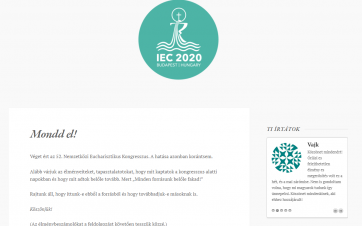
The IEC is a message for the entire world

This Sunday afternoon in Radio Kossuth, the portrait interview series, that has been launched to introduce the guest speakers and witnesses of the Budapest International Eucharistic Congress, continued. Following Cardinal Péter Erdő’s exclusive and personal introduction, this time a talk with Archbishop Piero Marini was on the air.
Born in Valverde, Lombardy, the Archbishop’s summers are generally spent at the scene of his childhood. He loves to return again and again to his hometown, to the village once with a population of six hundred, but nowadays with as few as one hundred inhabitants only. Still, the Church Dignitary prefers to take some part of his holidays there. “I do my best to manage a day or two in Valverde each year, maybe to make me feel a bit younger” – said Mons. Marini to the Radio Kossuth reporter.
Afield in the open air
Last year Archbishop Piero Marini sent a deeply moving and shocking message for the online pre-meeting, organised in the spirit of the Eucharist, whereby he encouraged everyone for an ecological conversion. As it has been revealed in the course of the interview, his entire childhood was characterised by the amazing natural environment he was living in. “As a kid we were left free, our parents let us move around unrestricted. No one took us into school, since there was nothing that could put us in danger.
Thus, we were allowed to spend the days freely out in the nature, in the green, in the fields and forests. We were let to live in total freedom, in a beautiful symbiosis with the nature” – recalled his childhood years Piero Marini.
A joking Holy Spirit
Goes without saying, the interview touched the story of Marini’s first meeting with Karol Wojtyla in Krakow in 1973. Back then Wojtyla was a Cardinal and later on became the Head of the Catholic Church as Pope John Paul II. Archbishop Marini was working for long decades as a direct, close associate of the late Pontiff. The IEC guest speaker shared his memories of the papal conclave, when the Polish Cardinal was elected Pope. “That time no one has ever thought of having a pope from Poland. We can say, the Holy Spirit played a joke towards the Church.” – said Mons. Marini, mentioning that he has made 74 trips abroad with Pope John Paul II and six with Pope Benedict XVI. “(…) Right away we understood each other, or to put it better, a reciprocal trust developed. I can really say it was mutual, since the Pontiff trusted me. Whatever I was doing he was secure with it and accepted. He understood that he could count on me. There had never been the slightest friction or misunderstanding between us. Generously, he always approved my suggestions. All the more so, since he was very sensitive for the different cultures, for the enculturation, especially when we were in Africa, Asia or in Latin-America. When he saw the faithful participating in the Holy Mass by expressing it in their own culture and tradition, he was extremely happy.” – as Mons. Marini recalled the days he had spent with the Polish Pope.
On the attempted assassination of Pope John Paul II.
The interview also touched the topic of Ali Agca’s assassination attempt on the Pontiff in 1981. As to Archbishop Marini, the Pope’s change was not really due to this attempt, but rather to his illness. In the wake of his Parkinson’s disease the Pope became a bit silent, spoke less since his illness made him sad. The Holy Father’s deteriorated health condition became publicly visible and clear for the world during the Mass he celebrated in Sarajevo. “All of a sudden the Holy Father started to tremble. But not only because of the chilly weather, but on account of his Parkinson’s disease.
These two factors together triggered a dramatic effect. He was about to finish the Mass celebration. But then his Secretary drew near to him, saying a few words. I also came forward, took his hands and rubbed it a little to warm it up. His hands were ice cold, a bone-chilling cold. Fortunately he managed to overcome all these difficulties.” – recalled Mons. Marini of what had happened.
Balance
As the Master of Pontifical Liturgical Celebrations under St. Pope John Paul II, and in that capacity Archbishop Marini was called for a special assignment. Following the Second Vatican Council, the liturgies that were celebrated only in Latin so far, could have been applied by each country in their own native language from then onwards. Talking about his appointment Mons. Marini highlighted the responsibility that came with:
“Whenever we were on the road, travelling around the world, we had to learn how to adapt and put into practice the liturgy in every country of the Earth. The Holy Father kept an extremely close eye on that. We were supposed to find a balance. The spirit of Rome had an utmost importance, on the other hand its application had to go hand in hand with the local versions. Putting this practice into action was the key to attract people for attending the Holy Service, all in line with their own culture. This was a real challenge in my duty. At the same time it made not only me, but the Pontiff happy as well.”
The IEC as the symbol of renewal
Archbishop Marini has already made several trips to Hungary. He has paid visits to many attractive places, but enhanced one of his favourites, the location of the coming International Eucharistic Congress, namely: Budapest. “This is a real European city, in the truest sense of the word. The Hungarians are real European people, a nation with its own characteristics. Currently, Hungary is the heart of Europe. I do hope that the Congress itself will also help to overcome this pandemic, and will become the symbol of the renewal not only for Hungary, but for the entire world.”
Mons. Piero Marini is also the President of the International Eucharistic Congress. He strongly hopes that he can attend in person the Budapest World Meeting to be held in September. “The vaccination is the only way to defeat this virus. I believe that the Congress will be held, in line with and respecting all the regulations of the secular authorities. This Congress, also as a sign of revival, should be held.” – stated Mons. Marini.
Source: Radio Kossuth
Photo: IEC Secretariat










